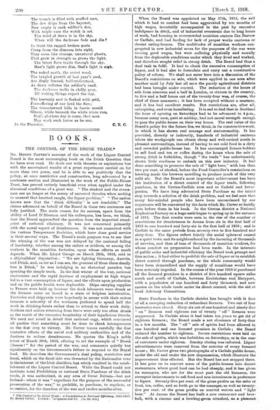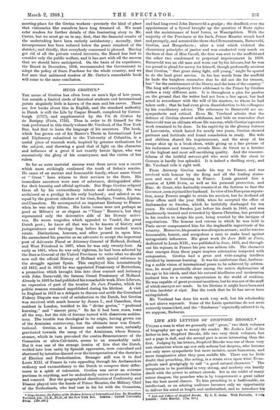BOOKS.
THE CONTROL OF THE DRINK TRADE.*
Mn. HENRY CanTER's account of the work of the Liquor Control Board is the most encouraging book on the Drink Question that we have ever read. He deals not with theories or aspirations but with the ascertained results of a great experiment carried on for more than two years, and he is able to say positively that the policy, at once restrictive and constructive, long advocated by a moderate section and illustrated in the work of the Public-House Trust, has proved entirely beneficial even when applied under the abnormal conditions of a great war. " The student and the states- man are no longer at the mercy of untested theories when seeking to unravel that knotted tangle, the liquor problem." " The nation knows now that the drink difficulty ' is not insoluble." The claims advanced on behalf of the Board in these two sentences are fully justified. The main reason for its success, apart from the ability of Lord D'Abernon and his colleagues, has been, we think, that the Board approached the question from the impartial stand- point of national efficiency. It was not concerned primarily with the moral aspect of drunkenness. It was not connected with the various Temperance Societies, which have done good service in their several ways. The Board's main purpose was to see that the winning of the war was not delayed by the national failing of insobriety, whether among the sailors or soldiers, or among the workers in the munition factories, upon whose efforts so much depends. When Mr. Lloyd George on March 29th, 1915, said to a shipbuilders' deputation : " We are fighting Germany, Austria, and Drink, and, as far as I can see, the greatest of these three deadly foes is Drink," he was indulging in no rhetorical paradox but speaking the simple truth. In the first winter of the war, national excitement and the rapid increase of employment at high wages led to a vast consumption of liquor, and the effects upon production and on the public health were deplorable. Ships carrying supplies to France were held up because the dock labourers were drunk or the firemen came on board in a state of helpless intoxication. Factories and shipyards were hopelessly in arrear with their orders because a minority of the workmen preferred to spend half the week in drinking-bouts rather than to attend to their work daily. Soldiers and sailors returning from leave were only too often drunk as the result of the excessive hospitality of their injudicious friends. We need not recall in detail that national orgy, which convinced all parties that something must be done to check intemperance as the first step to victory. Mr. Carter traces carefully the first tentative efforts of the naval and military authorities and of the Justices to reduce drunkenness. He quotes the King's noble letter of March 30th, 1915, offering to set the example of " Dowri classes t " for the period of the war, and comments quietly but significantly on the Government's failure to respond to the' Royal lead. He describes the Government's dual policy, restrictive and fiscal, which on the fiscal side was thwarted by the Nationalist veto in the interest of the Irish distillers, but which resulted in the estab- lishment of the Liquor Control Board. While the Board could not institute total Prohibition or national State -Purchase of the drink trade, ,it was authorized, in any area of Great Britain—but not Ireland—where it was " expedient for the purpose of the successful prosecution of the war," to prohibit, to purchase, to regulate, or to restrict, for the duration of the war and twelve months after.
• The Control of the Drink Trade : a Contribution to Notional Efficiency, 1916-1917. By Henry Carter. London : T..o•igmana and Co. (7e. 6d. net.] When the Board was appointed on- May 27th, 1915, the evil which it had to combat had been aggravated by ten months of high wages, invariably of in the past by excessive indulgence in drink and of industrial overstrain due to long hours of work, bad housing in overcrowded munition centres like Barrow or Carlisle, and bad feeding for hick of proper works canteens or decent eating-houses. The multitudes of munition workers con- gregated in new industrial areas for the purposes of the war were earning good wages, but were suffering physically and morally from the deplorable conditions under which they lived and worked, and therefore sought relief in strong drink. The Board had thus a dual task to fulfil. It had to check the excessive consumption of liquor, and it had also to formulate and carry out a constructive policy of reform. We shall not enter here into a discussion of the Board's restrictions on sale, which were applied in one area after another until by July last all save the purely agricultural districts had been brought under control. The reduction of the hours of sale from nineteen and a half in London, or sixteen in the country, to five and a half hours out of the twenty-four was, of course, the chief of these measures ; it has been accepted without a murmur, and it has had excellent results. But restrictions are, after all, uninspiring, and even humiliating. It is sad to find that in Scotland the hour of opening on Saturdays had to be advanced to 4 p.m., because many men, paid at midday, had not moral strength enough to pass the .public-house on their way home. The real value of the Board's policy for the future lies, we think, in its constructive work, in which it has shown real courage and statesmanship. It has provided, directly or indirectly, hundreds of industrial canteens where the workpeople can obtain cheap and well-cooked meals in pleasant surroundings, instead of having to eat cold food in a dirty and crowded public-house bar. It has encouraged licence-holders to sell food and tea or coffee during the hours when the sale of strong drink is forbidden, though " the trade " has unfortunately shown little readiness to embark on this new industry. It had done something to promote the sale of " light beer," with less than ttvo per cent. of alcohol, before the Food Controller's restrictions on brewing made the brewers unwilling to produce much of this very mild ale. But the Board's most important achievement has been the institution of a direct control of the liquor trade, following purchase, in the Gretna-Carlisle area and at Enfield and Inver- gordon. We have long advocated State Purchase as the initial step towards a solution of the drink problem, and we feel sure that many fair-minded people who have been unconvinced by our arguments will be converted by the facts which Mr. Carter so lucidly puts before them in his book. In the Gretna district a National Explosives Factory on a huge scale began to spring up in the autumn of 1915. The first results were seen in the rise of the number of conviotions for drunkenness in Annan from six in the first half of 1915 to one hunched and forty-six in the first half of 1916 ; and in Carlisle in the same periods from seventy-two to five hundred and sixty-four. The figures reflect faintly the social upheaval caused in a quiet town and its neighbourhood by the incoming of thousands of navvies, and then of tens of thousands of munition workers, for whose comfort no preparation had been made. In the interests of public order and industrial efficiency the Board took prompt and firm-action ; it had either to prohibit the sale of liquor or to establish direct control through purchase, or the whole community would have been demoralized and the supply of munitions would have been seriously impeded. In the course of the year 1916 it purchased all the licensed premises in a district of five hundred square miles north and south of Carlisle, between Ecclefechan and Maryport, with a population of one hundred and forty thousand, and now carries on the whole trade under its direct control, with the aid of local Advisory Committees.
State Purchase in the Carlisle district has brought with it first of all a sweeping reduction of redundant licences. Two out of four breweries were closed. Sixty-six out of one hundred and ninety-five " on " licences and eighteen out of twenty " off " licences were suppressed. In Carlisle alone it had taken ten years to get rid of eighteen licences ; the Board made a net clearance of forty-four in a few months. The " off " sale of spirits had been allowed in one hundred and one licensed premises in Carlisle ; the Board reduced the number to eighteen. Severe restrictions were laid on the sale of spirits, which was forbidden on Saturdays, or in the case of customers under eighteen. Sunday closing was enforced. Liquor advertisements were removed from the exterior of every licensed house ; Mr. Carter gives two photographs of a Carlisle public-house, under the old and under the new dispensation, which illustrate the improvement thus effected. But the Board has not stopped there. It has gone on to convert some of the public-houses into decent restaurants, where good food can be had cheaply, and it has given its managers, who are for the most part the old licensees, the strongest inducements to sell-food and non-intoxicants in preference to liquor. Seventy-five per cent. of the gross, profits on the sales of food, tea, coffee, and so forth go to the manager, as well as twenty- five per cent. of the gross profits on aerated waters and " light beer." At Annan the.Aoard has built a new restaurant and beer- hall, with a cinema and a bowling-green attached, as a Pleasant-
meeting-place for the Gretna workers—precisely the kind of place that visionaries like ourselves have long dreamed of. We must refer readers for further details of this fascinating story to Mr. Carter, but we must go on to say, first, that the financial results of the undertaking have been entirely satisfactory ; secondly, that intemperance has been reduced below the peace standard of the district; and thirdly, that everybody concerned is pleased. Having got rid of all the private vested interests, the Board has had to consider only the public welfare, and it has met with all the success that we should have anticipated. On the basis of its experience, the Board in December, 1916, recommended the Government to adopt the policy of State Purchase for the whole country, and we feel sure that unbiassed readers of Mr. Carter's remarkable book will come to the same conclusion.



























 Previous page
Previous page